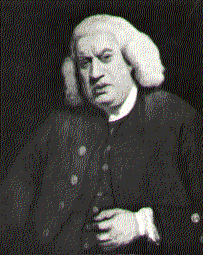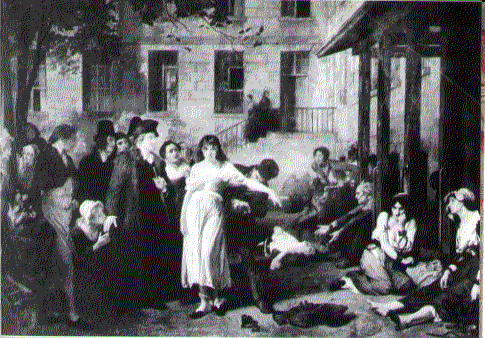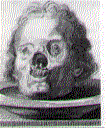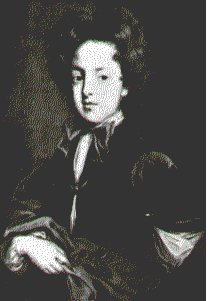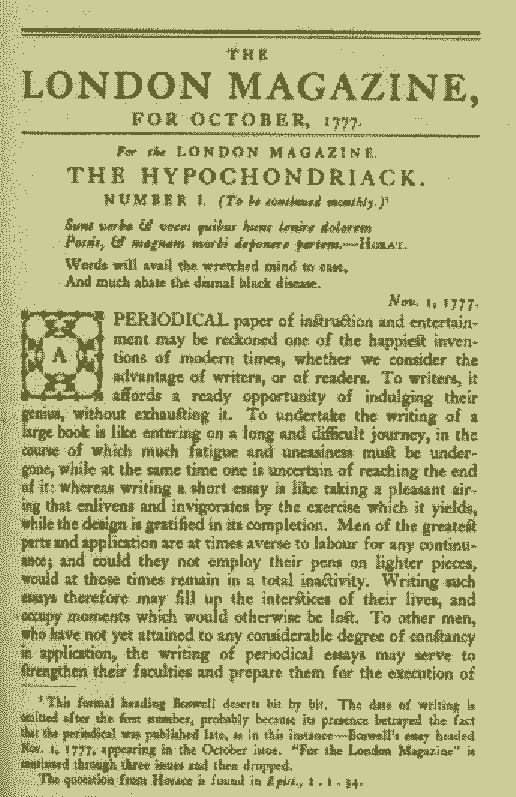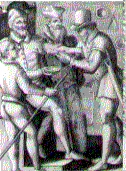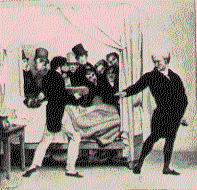|
|
Sam's Word Wisdom...
Thank you for coming to use this medical portion of my world famous dictionary (17), published in 1755. I hope it will be of some help in your everyday lives. You may click on some of the definitions below to be linked to the other useful pages in this remedy booklet. I must now go examine in detail the outside world for my inquisitive mind is always curious, as you observed in my careful notes about Scotland. That was quite a journey. I believe I hear Boswell calling. Good day. Dr. Samuel Johnson abo'rtive: That which is born before the due time. Take the fine skin of an abortive, and, with starch thin laid on, prepare your ground or tablet. Peacham, On Drawing. abracada'bra: A superstitious charm against agues. aco'usticks: (2) medicine to help the hearing. Quincy. Aegypti'acum: An ointment consisting only of honey, verdigrease and vinegar. Quincy. Ae'thiops-mineral: A medicine so called, from its dark colour, prepared of quicksilver and sulphur, ground together in a marble mortar to a black powder. Such as have used it most, think its virtues not very great. Quincy. agi'llochum: Aloes-wood. A tree in the East-Indies, brought to us in small bits, of a very fragrant scent. It is hot, drying, and accounted a strengthener of the nerves in general. The best is of a blackish purple colour, and so light as to swim upon water. Quincy. alexipha'rmick: That which drives away poison; antidotal; that which opposes infection. alke'rmes: In medicine, a term borrowed from the Arabs, denoting a celebrated remedy, of the form and consitence of a confection; whereof the kermes berries are the basis. The other ingredients are pippin-cyder, rose-water, sugar, ambergrease, musk, cinnamon, aloes-wood, pearls, and leaf-gold: but the sweets are usually omitted...Chambers. a'lmonds of the throat, or tonsils: called improperly almonds of the ears; are two round glands placed on the sides of the basis of the tongue, under the common membrane of the fauces...they frequently are the occasion of a sore throat. Quincy. ami'ss: (7) Impaired in health; as, I was somewhat amiss yesterday, but am well to day. a'mper: A tumour, with inflammation; bile: a word said, by Skinner, to be much in use in Essex; but, perhaps not found in books. anacatha'rtick: Any medicine that works upwards. Quincy. aphrodisi'acal, aphrodisi'ack: Relating to the venereal disease. antipestile'ntial: Efficacious against the infection of the plague. a'sthma: A frequent, difficult, and short respiration, joined with a hissing sound and a cough, especially in the night-time, and when the body is in a prone posture; because then the contents ofthe lower belly bear so against the diaphragm, as to lessen the capacity of the breast, whereby the lungs have less room to move. Quincy atrabila'rian: Melancholy; replete with black choler. The atrabilarian constitution, or a black ,viscous, pitchy consistence of the fluids, makes all secretions difficult and sparing. Arbuthnot, On Diet. a'trophy: Want of nourishment; a disease in which what is taken at the mouth cannot contribute to the support of the body. ba'gnio: A house for bathing, sweating, and otherwise cleansing the body. bde'llium: An aromatick gum brought from the Levant, used as a medicine and a perfume... Chambers. be'dehouse: An hospital or almshouse, where the poor people prayed for their founders and benefactors.
the insane, or bedlams... be'dlam: (2) A madman; a lunatick. be'zoar: A medicinal stone, formerly in high esteem as an antidote...At present, it begins to be discarded in the practice of medicine...Savary. Chambers. blood: (1) The red liquour that circulates in the bodies of animals... case: (4) In ludicrous language, condition with regard to leanness, or health. For if the sire be faint, or out of case,/He will be copy'd in his famish'd race. Dryden's Virgil ca'udle: A mixture of wine and other ingredients, given to women in childbed, and sick persons. cell: (5) Little bags or bladders, where fluids, or matter of different sorts are lodged; common both to animals and plants. Quincy. chiru'rgeon: One that cures ailments, not by internal medicines, but outward applications. It is now generally pronounced, and by many written, surgeon. chloro'sis: The green-sickness.
the head of a person dead of syphilis, a venereal disease... to clap: (5) To infect with a venereal poison. If the patient hath been formerly clapt, it will be the more difficult to cure him the second time, and worse the third. Wiseman's Surgery. conta'gion: (1) The emission from body to body by which diseases are communicated. If we two be one, and thou play false,/ I do digest the poison of thy flesh,/ Being strumpeted by thy contagion. Shakespeare, Comedy of Errours. cough: A convulsion of the lungs, vellicated by some sharp serosity. It is pronounced coff.
Alex Pope as young child, suffered from crookback... cro'okbacked: Having bent shoulders. A dwarf as well may for a giant pass,/ As negroe for a swan; a crookback'd lass/ Be call'd Europa. Dryden's Juvenal, Sat. 8. cro'psick: Sick with repletion; sick with excess and debauchery. diabe'tes: A morbid copiousness of urine; a fatal colliquation by the urinary passages. eccopro'ticks: Such medicines as gently purge the belly, so as to bring away no more than the natural excrements lodged in the intestines. elephanti'asis: A species of leprosy, so called from covering the skin with incrustations like those on the hide of an elephant. empa'sm: A powder to correct the bad scent of the body. ephe'mera: (1) A fever that terminates in one day. e'vil: Malady; disease: as the king's evil./ At his touch, Such sanctity hath heaven given his hand,/ They presently amend./ -What's the disease he means?/ -'Tis call'd the evil. Shakespeare's Macbeth. fe'ver: A disease in which the body is violently heated, and the pulse quickened, or in which heat and cold prevail by turns. It is sometimes continual, sometimes intermittent.
a page from Boswell's Hypochondriack essays... hypochondri'acal, hypochondri'ack: (1) Melancholy; disordered in the imagination. (2) Producing melancholy. itch: (1) A cutaneous disease extremely contagious, which overspreads the body with small pustules filled with a thin serum, and raised as microscopes have discovered by a small animal. It is cured by sulphur. la'zar: One deformed and nauseous with filthy and pestilential disease.
to bloodlet, sometimes done with leeches... leech: (2) A kind of small water serpent, which fastens on animals, and sucks the blood: it is used to draw blood where the lancet is less safe, whence perhaps the name. li'nctus: Medicine licked up by the tongue. lo'zenge: (2) Lozenge is a form of medicine made into small pieces, to be held or chewed in the mouth till melted or wasted. maw-worms: Ordinary gut-worms loosen, and slide off from , the intern tunick of the guts, and frequently creep into the stomach for nutriment, being attracted thither by the sweet chyle; whence they are called stomach or maw-worms. Harvey, On Consumptions. me'grim: Disorder of the head. There screen'd in shades from day's detested glare,/ Spleen sighs for ever on her pensive bed,/ Pain at her side, and megrim at ther head. Pope. melancho'ly: (2) A kind of madness, in which the mind is always fixed on one object. o'pium: A juice, partly of the resinous, partly of the gummy kind. It is brought to us in flat cakes or masses, usually of a roundish figure, very heavy and of a dense testure, not perfectly dry: its colour is a dark brownish yellow; its smell is very unpleasant, of a dead faint kind; and its taste very bitter and very acrid. It is brought from Natolia, from Egypt, and from the East-Indies, where it is produced from the white garden poppy...When the heads grow to maturity, but are yet soft, green and full of juice, incisions are made in them, and from every one of these a few drops flow of a milky juice, which soon hardens into a solid consistence. These drops are gathered with great care, and the finest opium proceeds from the first incisions...The ancients were greatly divided about the virtues and use of opium; some calling it a poison, and others the greatest of all medicines. At present it is in high esteem, and externally applied it is emollient, relaxing and discutient, and greatly promotes suppuration...A moderate dose of opium taken internally...its first effect is the making the patient cheerful, as if he had drank moderately of wine; it removes melancholy, excites boldness, and dissipates the dread of danger...it afterwards quiets the spirits, eases the pain, and disposes to sleep. After the effect of a dose of opium is over, the pain generally returns in a more violent manner...An immoderate dose of opium brings on a sort of drunkenness, cheerfulness and loud laughter...Those who have accustomed themselves to an immoderate use of opium, are subject to relaxations and weaknesses of all the parts of the body...they lose their appetite, and in fine grow old before their time. Hill. pharmaco'polist: An apothecary; one who sells medicines. pleu'risy: Pleurisy is an inflammation of the pleura, though it is hardly distinguishable from an inflammation of any other part of the breast, which are all from the same cause, a stagnated blood; and are to be remedied by evacuation, suppuration or expectoration, or all together. Quincy. pox: (1) Pustules; efflorescencies; exanthematous eruptions. (2) The venereal disease. This is the sense when it has no epithet. /Wilt though still sparkle in the box, /Still ogle in the ring?/ Can'st thou forget thy age and pox. Dorset. puke: Vomit; medicine causing vomit. to puke: To spew; to vomit. The infant/ mewling and puking in the nurse's arms. Shakespeare. quack: (1) A boastful pretender to arts which he does not understand. / Some quacks in the art of teaching, pretend to make young gentlemen masters of the languages, before they can be masters of common sense. Felton, On the Classicks. (2) A vain boastful pretender to physick; one who proclaims his own medical abilities in publick places. (3) An artful tricking practitioner in physick. Despairing quacks with curses fled the place, /and vile attorneys, now an useless race. Pope. qualm: A sudden fit of sickness; a sudden seizure of sickly languor. re'cipe: A medical prescription. /Th' apothecary train is wholly blind,/From files a random recipe they take, /And many deaths of one prescription make. Dryden. saliva'tion: A method of cure much practised of late in venereal, scrophulous, and other obstinate causes, by promoting a secretion of spittle. Quincy.
to scarify... to sca'rify: To let blood by incisions of the skin, commonly after the application of cupping-glasses. sha'nker: A venereal excrescence. simple: A single ingredient in a medicine; a drug. It is popularly used for an herb. simple'r: A simplist. An herbarist. spi'ttle: (Corrupted from hospital, and therefore better written spital, or spittal.) Hospital. It is still retained in Scotland. ta'bid: Wasted by disease; consumptive. tre'acle: (1) A medicine made up of many ingredients. va'pour: (2) (In the plural.) Diseases caused by flatulence, or by diseased nerves; hypochondriacal maladies; melancholy; spleen. yux: The hiccough.
|
